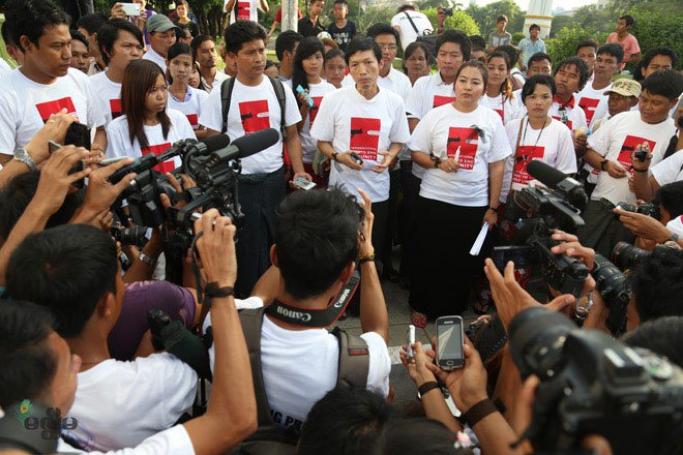Beaten by batons, locked up, threatened with lengthy prison sentences: how is a journalist to react to the threat posed by uniformed or plain-clothed officials and laws that do not appear to respect the freedom of the press?
Myanmar journalists are wise to be wary. Since the country began opening up under President U Thein Sein in 2011, the media has faced an uneasy relationship with the government. To be fair, the government has at least created a façade of engagement with the Fourth Estate, at times seemingly beyond the call of expected duty. Since his promotion last August to Information Minister, U Ye Htut has gone out of his way to connect with reporters and editors. Far from being aloof, as ministers often are, U Ye Htut has made an effort to work with journalists. As Information Minister he spent two days last March at an international media conference in Yangon and afterwards fielded questions for an hour. International journalists at the event were impressed.
Today, however, some Myanmar media organisations are boycotting U Ye Htut over the alleged mistreatment of journalists during the crackdown on protesters at Letpadan on March 10 and what they claim are the minister’s “untruths” over the handling of demonstrations and media freedom. As this issue of Mizzima Weekly was going to press, several media groups said they would refuse to publish government news and boycott an International Press Institute world congress being held in Yangon from March 27 to 29, in partnership with some NGOs and media groups, including Mizzima Media. The theme of the congress is “On the path to a free media”. The boycott – and blacked out front pages on some newspapers in place of government news – follows the beating and arrests of journalists at Letpadan. U Ye Htut seemed unperturbed by the boycott and said in a Facebook post, his preferred form of communicating with the public, that state-run media would make up for the lack of coverage of government events by private sector newspapers and journals.
Journalists face a dilemma. Dismissive comments by government officials that make light of the challenges facing journalists trying to do their job in Myanmar cannot detract from the threats, intimidation and archaic laws that seek to muzzle the press. The use of the law – that last week saw the chief editor and a reporter of the Myanmar Post journal sentenced to two months’ jail for defamation over a report about military representatives in parliament and the seven year sentences being served by the chief executive officer and four journalists from Unity Journal for breaching the 1923 Official Secrets Act over a report about a military facility – are clearly aimed at sending a blunt cautionary message to the media. The government typically tries to sidestep these issues, claiming that there are laws ensuring the freedom of the press. It may say that but the reality is that laws, some dating to British colonial rule, are being used to put journalists and editors behind bars for doing their jobs. The Committee to Protect Journalists says Myanmar in 2014 ranked 10th of a list of countries with the most journalists in jail.
There is no doubt about room for improvement in journalism standards in Myanmar. Journalists and editors from the private sector and state-run media are climbing a steep learning curve in terms of professionalism and ethical behaviour. Mistakes are being made, as can reasonably be expected. But more often than not, journalists who step out of line do not end up being dealt with by the Myanmar Press Council [Interim], a body without teeth, but instead find themselves in police holding cells awaiting what are often draconian charges. As long as this situation prevails, no one can reasonably claim there is freedom of the press in Myanmar and that mechanisms are available to deal fairly with mistakes or misconduct.
Whether or not a boycott of government events and officials is an appropriate response to the pressure the media feel over recent events is open to debate. A journalist’s job is to ask questions of those in power, even if this is uncomfortable for government officials or leaders in business. If there are questions over the alleged mistreatment of the media, decisions made by government or issues about which the public has the right to be informed, they need to be asked.
This editorial was originally published in Mizzima Weekly, Issue 13, March 26, 2015.
You are viewing the old site.
Please update your bookmark to https://eng.mizzima.com.
Mizzima Weekly Magazine Issue...
14 December 2023
Spring Revolution Daily News f...
13 December 2023
New UK Burma sanctions welcome...
13 December 2023
Spring Revolution Daily News f...
12 December 2023
Spring Revolution Daily News f...
11 December 2023
Spring Revolution Daily News f...
08 December 2023
Spring Revolution Daily News f...
07 December 2023
Diaspora journalists increasin...
07 December 2023












